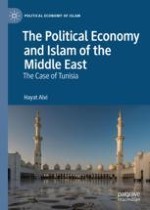2019 | OriginalPaper | Buchkapitel
6. Secularism Versus Political Islam: The Case of Tunisia
verfasst von : Hayat Alvi
Erschienen in: The Political Economy and Islam of the Middle East
Aktivieren Sie unsere intelligente Suche, um passende Fachinhalte oder Patente zu finden.
Wählen Sie Textabschnitte aus um mit Künstlicher Intelligenz passenden Patente zu finden. powered by
Markieren Sie Textabschnitte, um KI-gestützt weitere passende Inhalte zu finden. powered by
